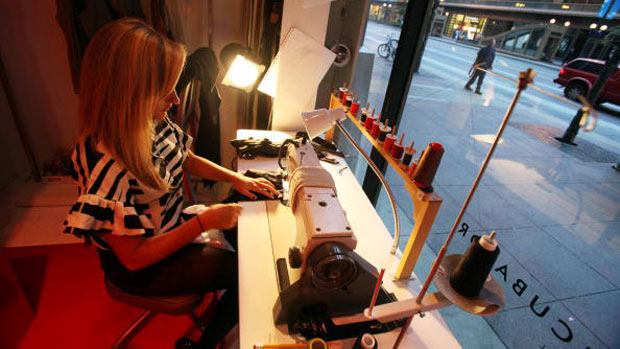London fashion: where would it be without unpaid interns?
Time to address ethical employment as well as ethical manufacturing, say Ruby Hoette and Sian Prime

A free daily email with the biggest news stories of the day – and the best features from TheWeek.com
You are now subscribed
Your newsletter sign-up was successful
IT IS OFTEN said that, without interns, London Fashion Week wouldn’t run at all. At last year’s edition of the event, representatives from this usually invisible workforce made an appearance, demonstrating by wearing white t-shirts with the slogan “PAY YOUR INTERNS”.
Reminiscent of the various political messages that have emblazoned the t-shirts designed by Katharine Hamnett in the past, they may not have attracted anywhere near the same amount of publicity or controversy. But these students, like Hamnett, were pointing out an important current issue: the exploitation of unpaid workers or “interns”, for which the fashion industry has become particularly notorious.
It is an issue that has not changed much for the better over recent years, despite increased scrutiny and media attention. And it’s taking its toll not only on the interns, but also on the very fabric of the industry.
The Week
Escape your echo chamber. Get the facts behind the news, plus analysis from multiple perspectives.

Sign up for The Week's Free Newsletters
From our morning news briefing to a weekly Good News Newsletter, get the best of The Week delivered directly to your inbox.
From our morning news briefing to a weekly Good News Newsletter, get the best of The Week delivered directly to your inbox.
Last year, Libby Page was highly critical of the industry’s reliance on unpaid labour in her Guardian article. She also acknowledged the potential benefits of an internship and pointed towards research that states that over 50% of employers said they wouldn’t give a job to a graduate with no experience. Undeniably, in this practical industry, learning through real world experience is valuable, and virtually impossible to imitate in an educational context.
The pro-internship argument usually centres on the impression that an internship is mutually beneficial. But it’s questionable whether this is the case. As most that have been there will tell you, it is known and accepted that interns are expected to perform primarily menial or administrative tasks, or coffee runs, and this for excessively long hours with little or no pay.
Fashion interns are working in these unpaid positions for up to 12 months – far longer than it would seem necessary to decide whether or not they would be suitable to hire for a paid position. This is in exchange for (an often unjustified) hope that it will lead to employment as they are replaced with the next wave of graduates more than happy to work for free. In fashion, having the name of a famous designer on your CV is apparently worth more than any sort of professional experience or insight.
In a letter to the fashion house Alexander McQueen last October, Shelly Asquith, a student and president of the University of the Arts London Student Union, makes some of these problems explicitly clear in response to their advertising a full-time unpaid internship. Despite this exposure forcing the company to issue a formal apology, and despite the fact that the law in the UK states that “integral” work must be awarded with the National Minimum Wage, unpaid internships continue to define the fashion industry.
A free daily email with the biggest news stories of the day – and the best features from TheWeek.com
This is a business model that is not only unproductive and unsustainable, but is in fact detrimental to the industry.
Working without pay has become a “luxury” that is, for most, unaffordable, leaving this “compulsory” experience beyond the financial means of a large group of talented graduates who are consequently unable to find a job in their field. This is especially problematic considering the increasingly hefty investment already made for their education.
Unpaid internships are excluding those probably best equipped to inject fresh insight and stripping the industry of the integrity, skill and craftsmanship that it was once built upon.
Unfortunately, companies seem too shortsighted to acknowledge the consequences of this practice, even as the diversity of their workforce and ability to innovate is compromised, and even as legal repercussions for hiring unpaid interns are on the increase.
This perhaps brings us closer to the essence of the problem: the pervasive mindset around internships that these companies are not only taking advantage of, but perpetuating. It seems many students feel forced to take on an unpaid internship. Students are led to believe it is “the thing to do” and that “everybody has to do it”.
So with the 2014 edition of London Fashion Week in full flow, the catwalks are pulsing with collections made a reality for a large part by thousands of unpaid interns. It is exactly at this moment that it is important to remind ourselves that unpaid internships are also having a negative impact on the industry; devaluing aspects that are vital to its very existence.
It is about time the fashion industry addressed ethical employment as well as ethical manufacturing and materials. But it is unlikely that this shift will be instigated by the industry itself. It is the role of fashion education to empower students to question accepted practices and, like Hamnett before them, challenge that which they feel is unethical or out of balance. After all, these students will define the fashion industry of the future and it is vital that they feel empowered to cultivate new ways of thinking, doing and being fashion.
Ruby Hoette is a lecturer in Design at Goldsmiths, University of London. Sian Prime is Director, MA Creative and Cultural Entrepreneurship at Goldsmiths, University of London.This article was originally published on The Conversation.
-
 The ‘ravenous’ demand for Cornish minerals
The ‘ravenous’ demand for Cornish mineralsUnder the Radar Growing need for critical minerals to power tech has intensified ‘appetite’ for lithium, which could be a ‘huge boon’ for local economy
-
 Why are election experts taking Trump’s midterm threats seriously?
Why are election experts taking Trump’s midterm threats seriously?IN THE SPOTLIGHT As the president muses about polling place deployments and a centralized electoral system aimed at one-party control, lawmakers are taking this administration at its word
-
 ‘Restaurateurs have become millionaires’
‘Restaurateurs have become millionaires’Instant Opinion Opinion, comment and editorials of the day
